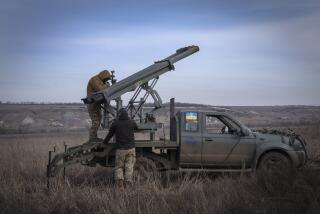Iraqi Troops in Kuwait Said to Suffer Critical Shortages : Military: Arab commanders quote defectors, say many of foe’s tanks could be useless.
- Share via
IN THE SAUDI DESERT — Iraqi troops massed in Kuwait are suffering from critical shortages of food, water, fuel and ammunition, according to defectors from the Iraqi military.
Arab military commanders, as well as the U.S. commanders backing up the Arab positions, said the shortages could make useless many of the 1,500 Iraqi tanks.
The shortages, and their corrosive effect on Iraq’s military capability, are largely a result of world trade sanctions against Iraq, officials said.
And the shortages come at a time when the U.S. and Arab forces are increasing their strength, with major new deployments in the next two weeks, including hundreds of U.S. tanks and anti-tank helicopters.
Military commanders said the arrival of additional troops in Saudi Arabia, together with the tightening economic stranglehold on Iraq, is helping to even the numerical odds that were stacked against Saudi Arabia and its allies in the first month of the Persian Gulf crisis.
As a result, many U.S. and Arab military officials interviewed here said, the likelihood of Saudi Arabia and the United States launching an offensive into Kuwait may be increasing.
These views appear to be at odds with widespread speculation in Washington and elsewhere that the failure of the embargo--not its success--could result in a U.S.-Saudi move into Kuwait.
The Iraqi defectors are coming in--in tanks and armored personnel carriers--at the rate of 50 to 100 a day in the western sector, said Brig. Gen. Mohammed Shehri, the Saudi army officer in charge of logistics for the Arab troops here.
“We learned from what we saw that they are really in a very poor condition,” Shehri said. “They don’t know the terrain, and there is no help from the Kuwaitis or Bedouins.”
Judging by the state of the equipment brought over by the defectors, the general said, “I really don’t think they can use all their tanks.”
Most of the defectors are enlisted men, and their morale is low, according to Saudi officers. But Gen. Shehri said that some of the defectors are lieutenants, captains and majors.
Many defecting troops say they were told on Aug. 1, the day before Iraq’s invasion of Kuwait, that they were going to Kuwait to drill with forces of the Gulf Cooperation Council, which is made up of the six countries on the Arabian Peninsula. Others said they were told they were going to attack Israel via Kuwait.
Several officials said that the chemical weapons protection gear the Iraqi soldiers are carrying is old and probably ineffective..
This prompted Shehri to suggest that there is more bluster than reality to the much-feared Iraqi threat to use chemical weapons against troops.
“I think it’s more for propaganda,” he said. “They will have problems first before we do.”
Despite the Iraqis’ mounting supply problems, the Arab troops arrayed across Saudi Arabia are a lightly armed force that U.S. officers describe as a “trip wire.” Its mission, according to Saudi military officials, is to delay the advance of an Iraqi offensive for about four hours while U.S. forces move up from the rear.
The Arab force is also designed to help channel tanks into “killing zones” where the Saudis and their allies would concentrate their tanks and anti-tank weapons to even the odds.
In doing so, however, Saudi Arabia’s Arab and Muslim forces would likely have major problems. For example, Egypt, which is contributing one of the larger Arab forces, has never conducted exercises with its new Arab military allies.
Also, the nine national forces operating here--soon to be 10 with the arrival of Pakistani troops--use a variety of different--and sometimes incompatible--weapons and equipment. In combat, this would further complicate the difficult task of supply.
As a result, as the 30,000 or so Arab troops take up defensive positions near the Kuwaiti border, the question arises: Do they have enough tanks to blunt even an Iraqi offensive debilitated by morale and supply problems?
“ Inshallah (God willing), we can,” said Col. Abdul Aziz Bedawi, a Saudi tank commander. “ Inshallah , we have enough tanks.”
But facing a larger force across the flat, featureless desert, the Saudis and their Arab allies are counting on air power to delay an Iraqi advance.
“When he becomes tired, exhausted, during the day, we will have a field day,” said a captain who commands a helicopter unit. “When he comes at night, the air force will take care of him.”
Among Arab forces, however, that is as close to boasting as the officers get. There is among Saudi and other Arab forces little of the bluster found among some American troops.
“Our mission is to enhance the defensive capabilities and help defend Saudi territories . . . to defend the holy places (Mecca and Medina),” said Maj. Gen. Mohammed Bilal, commander of the Egyptian forces in Saudi Arabia.
The Egyptian forces consist of paratroopers and anti-tank commandos, and a Saudi official said that if an Iraqi offensive comes, the Egyptian troops will likely be dropped behind the Iraqi tanks to disrupt their supply lines.
Although Saudi and other Arab officers sought to minimize the offensive option, several said that if Iraqi troops do come across, the Arab commanders will launch a counteroffensive aimed at liberating Kuwait.
But U.S. officers said it is more likely that the Arab forces will back up the American lines as the American forces move north.
More to Read
Sign up for Essential California
The most important California stories and recommendations in your inbox every morning.
You may occasionally receive promotional content from the Los Angeles Times.














